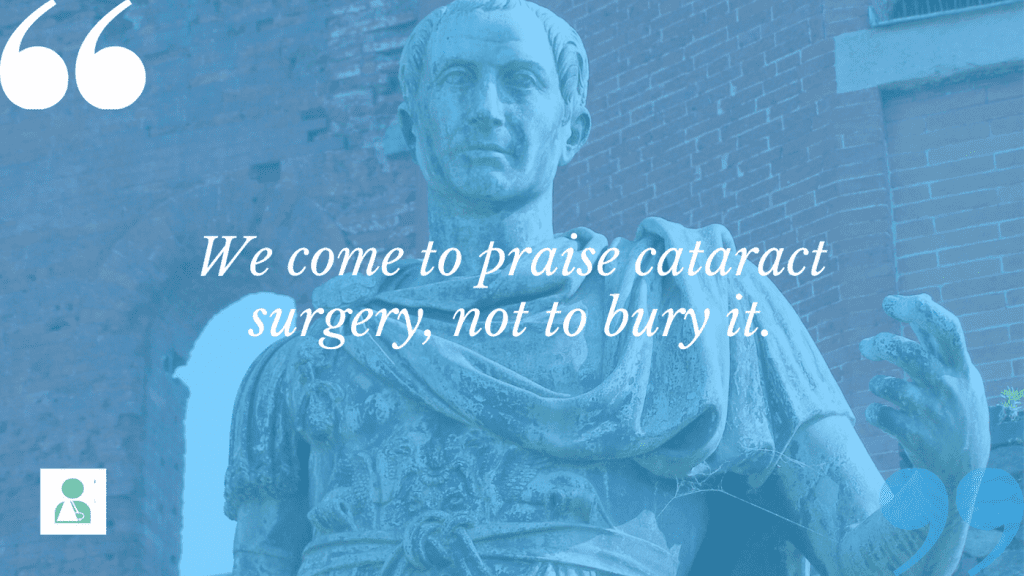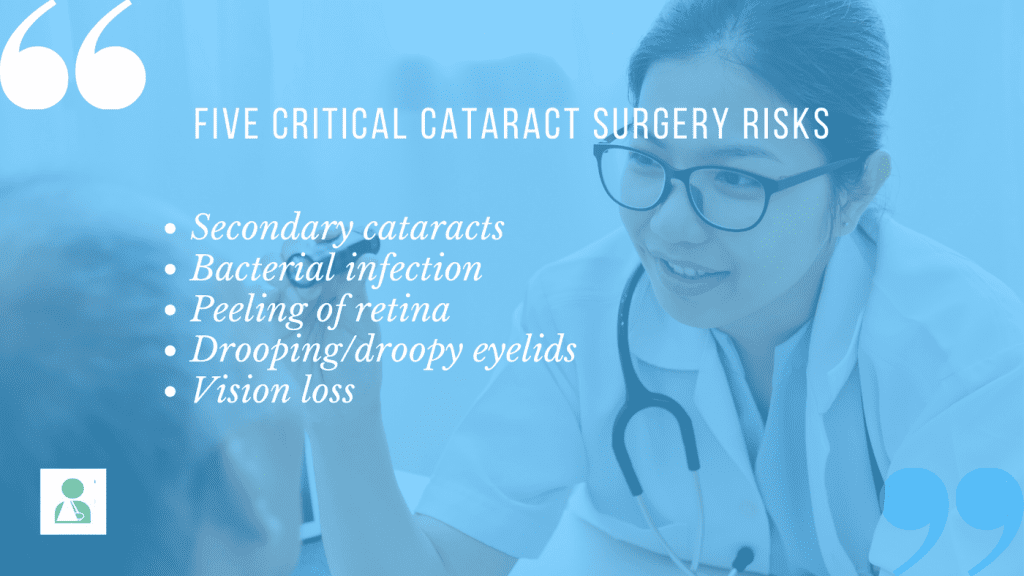Several Significant Risks of Cataract Surgery
May 27, 2020
We intend to address the risks of cataract surgery in this post. But think of The Medical Negligence Experts team as an even more altruistic version of Brutus from Julius Caesar.

In short, we don’t want to detract from the benefits of this optical operation to improve eye and vision health. This eye condition is often triggered by ageing or injury to the tissue around the lens of your eye.
Additionally, other matters can also set off the damaging effects of cataracts as an eye disease. These include:
- Genetic disorders;
- Medical conditions like diabetes, or;
- Even the long-term use of steroids.
Vision problems caused by cataracts in both eyes or just one eye can be unbearable. The Mayo Clinic cites a wealth of complications. These often include clouded/blurry loss of vision, double vision, night sight difficulties, and sensitivity to light and glare among others.
A quick overview of the surgery itself
In brief, cataract surgery requires a trained surgeon to emulsify and suction out broken pieces of a cornea’s natural lens. This type of lens capsule remains intact, too. Therefore, the surgeon can then install a replacement artificial intraocular lens (IOL, or artificial lens).
After the surgery, you’ll need to avoid eating or drinking for the first 12 hours. Additionally, eye drops might need to be applied over the next few days.
Technological advances in cataract surgery
The procedure itself has also advanced technologically. Firms are increasingly offering specialised lens implants and even combination procedures with refractive corneal surgery. Studies show improved procedures can decrease the need for glasses, reading glasses and contact lenses.
Ergo, any corrections from the procedure called cataract surgery can present welcome relief and improved life experience.
Risks of cataract surgery
But before you can truly appreciate the change cataract surgery offers, we’d advise you to be aware of the risks. It’s in our DNA to ensure you are compensated for any negligence on eye surgeries. As a result, we also want to inform you of what could happen if cataract surgery goes wrong. Above all, reach out to your eye doctor if complications of this sort set in.
1. Posterior capsule opacification (PCO)
Also known as the ‘secondary cataract,’ a PCO is the most common risk arising from cataract surgery.
Effectively, the surgery creates what is known as a capsular bag, which allows light to pass through the visual axis. But stubborn cells form, and sometimes subsequently invade the intraocular lens surface. When they divide, the free passage of light begins to scatter and vision becomes blurry.
Consequently, if PCO does occur, outpatient laser surgery is necessary to clear up vision complications.
2. Endophthalmitis
Endophthalmitis is a post-cataract surgery bacterial infection that occurs inside the eye. Though less common than PCO, it appears to require a bit more urgency in treatment. That’s because of the scale of damage it can cause to your vision and eye health.
Tina D. Turner, M.D., of Vision Aware, writes that the bacteria are capable of living on human skin. These bacteria are known as either staph or strep. Additionally, symptoms for endophthalmitis will start appearing within a week after the surgery. These can include:
- Decreasing vision;
- Eyelid swelling or redness;
- Pain or even discharge from the eye (usually green or yellow).
Dr Turner adds that antibiotic injections (for some cases, even additional surgery) are a common treatment. If you notice symptoms, act quickly: even with treatment, your vision and the eye itself may still face immutable damage.
3. Retinal Detachment
Retinal detachment is not exclusive to post-cataract surgical procedures. Those suffering from myopia or diabetes can also fall victim to this condition. In short, the retina begins to peel away or detach from the eye.
Without a secure retina, clear vision is all but impossible. Symptoms of retinal detachment include:
- Heavy feeling in the eye;
- Straight lines begin to appear as having more curvature;
- Shadows appearing in your peripheral vision, and;
- Brief flashes of light whenever the eye moves.
When retinal detachment happens, specialists advise that it’s a medical emergency requiring urgent action. Otherwise, the retina could peel off altogether and destroy all hopes of recovering vision.
Treatment options range from laser surgery to cryotherapy for more serious cases, or pneumatic retinopexy for more simple detachments.
4. Drooping eyelid
The incidence of ptosis, or drooping eyelid, was a once a far too common side effect of cataract surgery. Statistics show the rate of incidence was once as high as 13% after cataract surgery.
The frequency of this kind of incident is less now thanks to better technology and techniques. Additionally, we can pick up upon the symptoms fairly easily. Most notably, the upper eyelids sag, possibly affecting your vision or distance vision.
You can also suffer from either extremely dry or watery eyes, plus aches and weariness. Some may be forced to tilt their head back to hold a normal conversation and see what’s going on.

5. Vision loss
Vision loss can be a byproduct of all these risks, or simply the damage from a cataract surgery gone wrong. Some can take years to develop. Vision loss is rare in nature; however, it can occur years after cataract surgery as a result of a retinal detachment.
Above all, act immediately when you start to see floating specks or flashes of light on a regular basis.
UPDATE: Some addition risks
There are other types of risks, including YAG laser capsulotomy. This procedure becomes necessary to improve any existing eye problems after cataract surgery, particularly to improve vision.
There’s also the matter of age-related macular degeneration. It’s often a case by case basis as to whether cataract surgery will improve ARMD, for short. Be sure to consult your eye doctor: some studies show it might make your visual life better.
About the Medical Negligence Experts and the Risks of Cataract Surgery
This post is part of our ongoing series covering the risks involved with eye surgery. Consequently, our goal is to offer useful information regarding negligent corrective eye procedures.
Be sure to read more about this topic:
